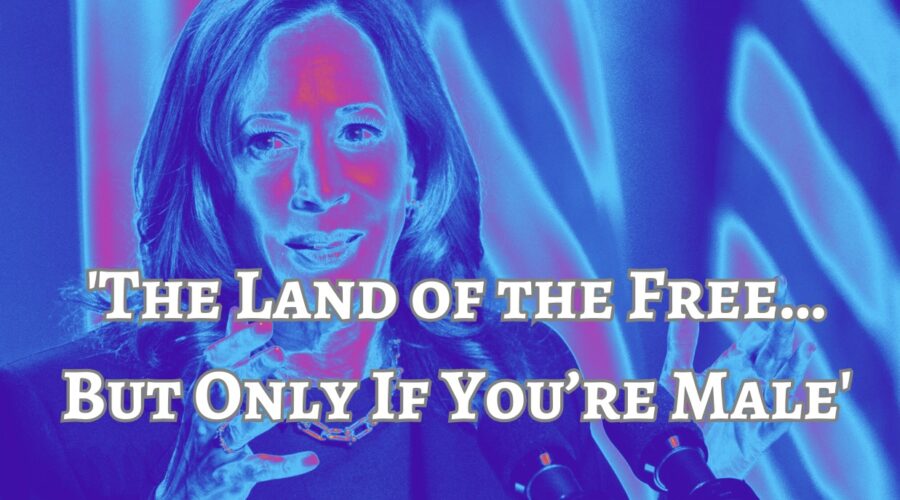Kamala Harris was supposed to be a historic figure, a torchbearer for progress, the long-awaited answer to what Hillary Clinton couldn’t deliver in 2016. Yet here we are, again, witnessing a presidential campaign that feels, in a word, underwhelming.
Underwhelming and disappointing, considering that the stakes in this election are higher than just another four years of Trump. They’re about whether women can continue to break barriers in American politics—or whether those barriers will be rebuilt, brick by misogynistic brick.

With the election just days away, instead of leading Donald Trump by a mile, instead of showcasing the power of diversity, experience, and intelligence, Harris has stumbled through a fog of indecision and missed opportunities.
The disappointing trajectory of her campaign raises a chilling question: if Kamala Harris can’t win, will the door close indefinitely on another woman Democrat being nominated for president?
First, let’s take a look at the root of the issue. Harris entered this race with a head start—or so it seemed. She was well-known, part of a historic administration, and poised to break through the highest glass ceiling. Yet for all that potential, the momentum fizzled. The campaign is marked by cautious decisions, missed opportunities, and a baffling reluctance to define herself. It’s like she’s been running in place, waiting for voters to find her—when she should be charging ahead and showing voters who she really is.
Compare her to Trump for a moment. Love him or loathe him, everyone knows what Trump stands for, even when his positions are as erratic as a ferret on caffeine. He radiates power, albeit in a blustery, chaotic way. Voters may not like him, but they sure as hell know him. Harris, on the other hand, has struggled to project that same clarity. Interviews and focus groups show a recurring theme: voters don’t really know what she stands for. Her message, when delivered, is a blur, a fuzzy mix of policy gestures that don’t seem to form a coherent narrative.
You’d think by now Harris would have leaned into her strengths, making bold statements about the future she envisions. But no. Instead, she’s run what feels like a scripted, timid campaign, as if she’s more interested in not losing than in actually winning. Where are the impassioned speeches that fire up a crowd? Where is the cutting critique of Trump’s chaotic, self-serving rule? Where is the searing vision of a better America? It’s like she’s afraid to make noise, afraid to get her hands dirty in the fray.
In fact, she had an ideal moment to show her mettle: the Al Smith Dinner. Instead of standing up and skewering Trump’s crassness with an eloquent takedown, Harris sent a video. A video. Nothing says “I’m not a threat” quite like a pre-recorded message at an event designed for live political sparring. Trump was there, in person, lobbing bombs. Harris mailed it in. Whose idea was that? It was the equivalent of bringing a salad to a barbeque.
Her policy platform hasn’t helped much, either. Instead of bold, sweeping proposals, we get small-bore offerings like a $50,000 tax break for small businesses. Sure, it’s a decent enough idea, but it’s not the kind of thing that captures the public’s imagination or addresses the major pain points of American life.
Her gestures toward Elizabeth Warren-style populism are undercut by her coziness with Wall Street types like Mark Cuban. And Cuban, for his part, has undercut her own policies—like taxing unrealized capital gains—while standing beside her on the campaign trail. Nothing says “I’m serious about progressive reforms” like hanging out with a billionaire who doesn’t believe in them.
Contrast this with Hillary Clinton’s 2016 campaign, which, despite its flaws, at least had a clear sense of purpose. Clinton was bold and meticulous, if not always relatable. Harris, on the other hand, feels like she’s running as the candidate of everyone and no one at the same time, a balancing act that satisfies neither progressives nor centrists.
But here’s the more troubling question: What if this isn’t just a Kamala problem? What if it’s bigger than that? What if Harris’s stumbles represent something deeper—a systemic reluctance to elect a woman as president? Because, if Kamala Harris, with her impressive resume and clear path to the nomination, can’t get traction, what message does that send to the next generation of women candidates?
Hillary Clinton’s loss in 2016 dealt a heavy blow to the idea that a woman could break through the ultimate political ceiling. But with Trump as her opponent, we chalked it up to unique circumstances: the Comey letter, Russian interference, sexism, and Clinton’s own baggage from decades in the public eye.
Now, however, we’re looking at a similar situation with Harris. Despite the fact that Trump’s conduct has grown more outrageous and legally entangled, Harris’s campaign can’t seem to pull away from him. It begs the question: is America simply not ready for a woman president?
Surprisingly, this is happening at a time when many other countries—often the ones we least expect—are electing women to the highest office. Even macho Mexico just elected its first woman president. Meanwhile, the United States, the self-proclaimed beacon of democracy and equality, still hasn’t crossed that bridge. It’s an irony worthy of Mark Twain himself. Perhaps we could call it “The Land of the Free…But Only If You’re Male.”
But let’s not overlook the darker consequences of a Harris defeat. Should she lose to Trump, it won’t just be a personal failure; it will be viewed as a referendum on the viability of women presidential candidates, particularly Democratic ones. If the first Black and Asian-American woman to be nominated can’t beat a man whose political career is synonymous with chaos, sexism, and vulgarity, what hope is there for the next woman who steps up? The argument will be made, and it will gain traction: America isn’t ready for a woman president.
Then there’s the cultural context: the women’s movement and the #MeToo movement, both of which have empowered women but also generated significant backlash. Harris, at the intersection of these forces, is emblematic of progress that threatens to spark resentment. And that resentment, however subtle or coded, will linger long after Election Day.
A Harris loss could embolden those who claim that pushing for gender equality has “gone too far,” that the pendulum needs to swing back. And that’s the danger: the pushback against women’s rights, disguised as electoral rejection of a candidate.
How far back would a Harris defeat set women in politics? Further than we’d like to imagine. It could reinforce a narrative that women aren’t up to the job, that they lack the “strength” or “toughness” needed to run the country, despite overwhelming evidence to the contrary. And that’s the real tragedy. Harris’s loss wouldn’t just be hers; it would be a loss for every woman who dreams of leading this country.
If Harris loses, it won’t be because America is ready to embrace her; it’ll be because too many voters—still—aren’t ready to embrace the idea of her.
And that’s a failure not of Kamala Harris, but of the society that remains stubbornly resistant to the progress she represents.
TONY CASTRO, the former award-winning Los Angeles columnist and author, is a writer-at-large and the national political writer for LAMonthly. org. He is the author of “Mantle: The Best There Ever Was”. He can be reached at tony@tonycastro.com.





